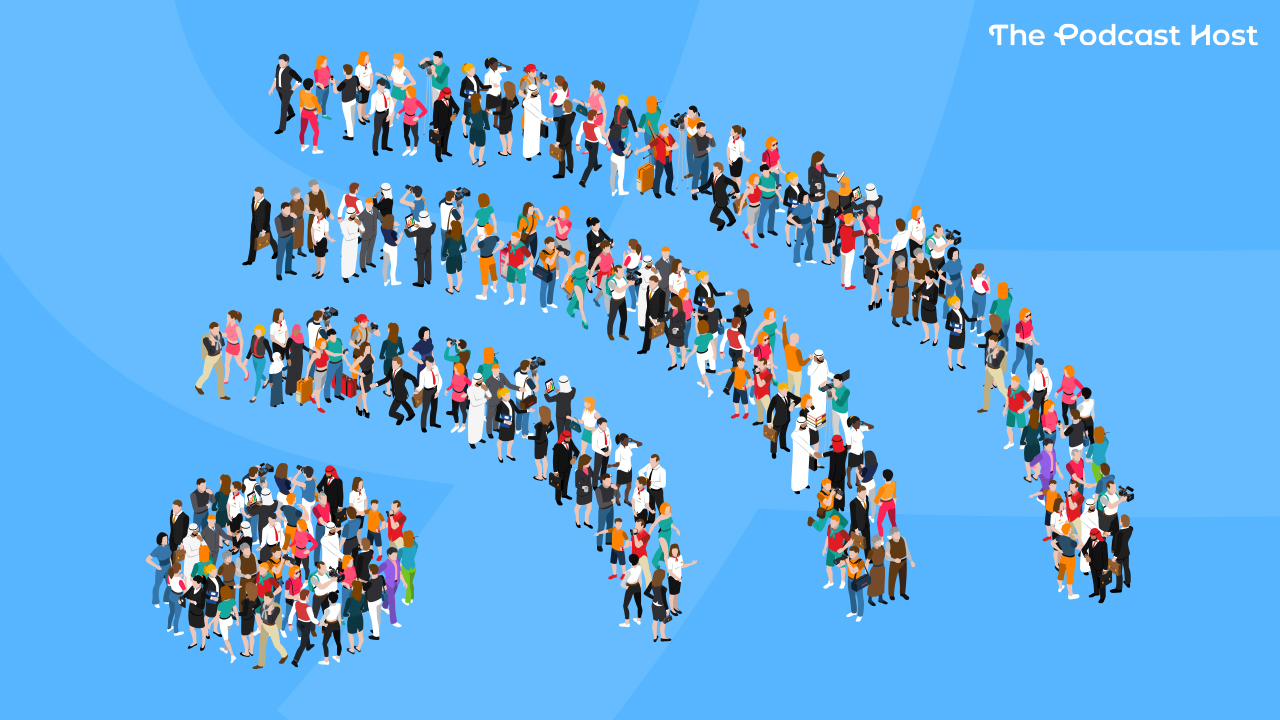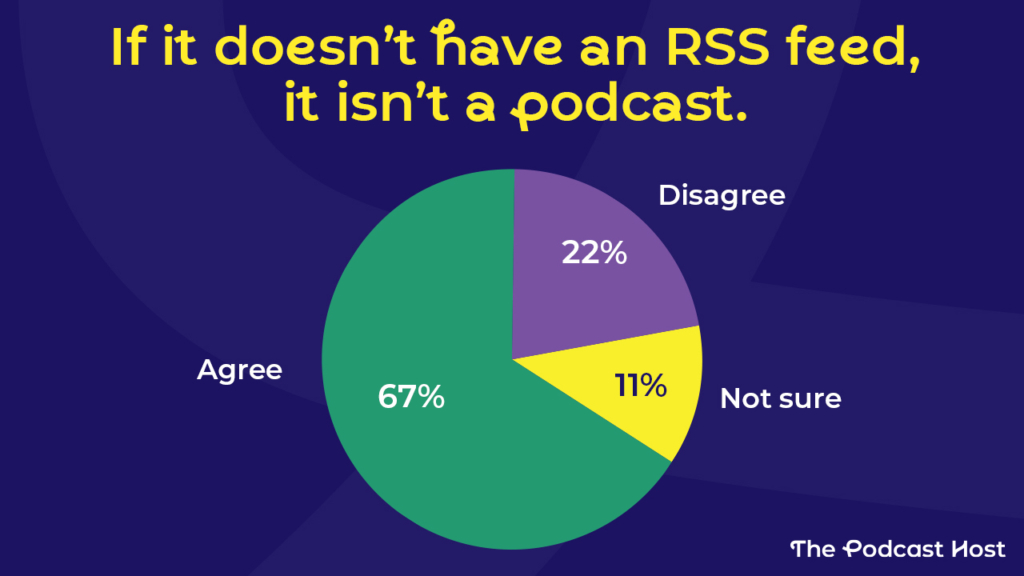“If It’s Not Got an RSS Feed, It’s Not a Podcast” say 67% of Podcasters

Podcasting has a lot of cake to eat right now. This month sees the 20th birthday of the word itself, whilst March celebrates the 25th birthday of the medium’s superpower – RSS.
But over the last two decades, the definition of what makes a podcast a podcast has been up for debate (whether we like it or not).
It really just depends on who you’re speaking to. Ask a seasoned podcaster what a podcast is, and they’ll likely say something like “media delivered via RSS”. Ask a listener or someone newer to podcasting, and they might say something like “a recording of two people talking”.
But the importance of RSS to the definition of what makes a podcast is something worth talking about. So we dipped into our network of indie podders to find out what they think.
And if you’re wondering, what exactly is an RSS feed? Don’t worry – this guide to RSS feeds in podcasting has everything you need to know.
Do Podcasts Need An RSS? Survey Results

The vast majority (67%) of the 70+ independent podcasters we surveyed told us they don’t believe a podcast can be called a podcast if it doesn’t have RSS.
22% said having an RSS feed wasn’t essential, and 11% said they weren’t sure.
Regardless of which way they voted, one thing’s for sure: podcasters have a lot to say about RSS. We gave survey respondents the opportunity to elaborate on their response, and most grabbed the keyboard with both hands.
Reading through all the responses we got, it looks like the RSS debate really all boils down to these main points:
RSS in Podcasting Debate – Decoded
Podcasting “should be open and accessible”
The argument for keeping podcasting open is a good one to start with, since this is really what makes the difference between audio that uses RSS and those that don’t.
Using an RSS feed to distribute your podcast episodes means it’s accessible to anyone to listen to on whichever listening platform they choose. Publishing content without an RSS means it’s restricted to whichever platform it’s been uploaded to (and usually gated).
Here at The Podcast Host, we’re big advocators of the drive to keep podcasting open (and here’s why). Industry initiatives have also emerged in the last few years seeking to protect open podcasting. The Podcast Standards Project is one of them. Podcasting 2.0 is another.
And it seems many creators believe it’s important to protect open podcasting, too. As one survey respondent said, podcasting “should be open and accessible and not in a walled garden.”
Another respondent said, “Open standards are really important. Companies want monopolies, and so they will often try to ignore/fight/manipulate open standards, and it is always the customer who suffers.“
‘The customer’ here refers to both creators and listeners.
Creators suffer as we’re restricted to one platform and lose a lot of control over our content (what we talk about, how we monetize, brands we work with, etc).
Daniel Ek, CEO of Spotify even recently admitted he knows walling in content doesn’t benefit podcasters: “While some [Spotify] exclusivity deals worked, generally it wasn’t aligned with what the creator wanted. The creator wants to have a broader audience,” he said.
Listeners suffer because they’re forced to move away from the listening platforms they normally use just to listen to an exclusive. Every time I want to listen to a podcast by Jon Ronson or Louis Theroux, it genuinely makes me angry that I have to go to the BBC Sounds app rather than just listening on Apple Podcasts like I do with everything else.
Keeping podcasting open through the use of RSS feeds also protects your content from being at the whim of one publisher. What if you were only able to publish your show on one listening channel, and then the company went bust or killed off its podcasting arm (as we saw happen this year with Google Podcasts)? RSS feeds ensure you, as a creator, are in complete control of how and where your podcast is shared online and how you monetize it.
“RSS is at the core of what podcasting is”
The vast majority of podcasters who took part in the survey agreed that if a podcast doesn’t have an RSS, it’s not technically a podcast. Therefore, it’s not surprising that “RSS is at the core of podcasting” was the most prevalent running theme in the survey responses.
Here are a few of the highlights:
“From the start, the artform that is podcasting needed an RSS feed. Without an RSS feed, it’s an audio file online“
“Podcast platforms, and therefore podcasts, are based around simple RSS distribution.“
“Podcasts are consumed through podcast directories and therefore need an RSS feed. If you just post to your website or YouTube you have a presentation of content, but not really a podcast.“
“If it’s only/mainly on YouTube, it’s a YouTube channel. If it’s on another platform as well, that’s repurposed/reposted content. If an episode is put in one place and then automatically available on pod-catchers everywhere, it’s a podcast.“
But not everyone agreed on this…
“RSS isn’t that important”
On the contra side of the argument, most of the 22% who said RSS isn’t essential to podcasting talked about the content being more important. A “podcast is more about the show’s format than if it’s on RSS or not,” one respondent said.
Another said, “How many people these days even know what an RSS feed is?” This was an interesting point since 11% of the podcasters who responded said they weren’t sure what they thought about RSS either way. A few comments also appeared from podcasters saying they weren’t sure what an RSS feed was. And if some podcast creators don’t know, you can bet most listeners don’t know either.
Because RSS is essentially an obscure-sounding background technology that most podcast listeners have never heard of or thought about, it’s easy to view it as unimportant. But, RSS is exactly why we can upload our shows and publish them in so many places without any one company “owning” them. We might not all know exactly what it is, but that makes it no less important.
And the “who cares?” argument is a slippery slope. The big players are counting on us not caring because abandoning RSS benefits them. It enables big platforms or networks to build walled gardens around their exclusive content and still call it podcasting, which confuses potential new listeners and existing fans of the medium.
“Podcasting needs to modernise”
While the technology we use to produce podcasts has evolved a lot in the past 20 years, distribution technology hasn’t. RSS feeds still essentially work the same way they did when podcasting started, over two decades ago.
But that isn’t because the technology is ‘behind the times’. It has just worked so well since its invention. That’s not to say the industry isn’t building on or enhancing RSS in some ways, either (that’s the purpose of podcasting 2.0, where we see the ability to add transcriptions, cross-app comments, and reviews). But its general principles remain the same.
However, our survey suggests that not all podcasters see it like that.
“If we don’t challenge everything and try new things we never evolve or move forward,” one respondent said. Another said:
“I think RSS is a great way to distribute podcasts, and I’d prefer it stayed the standard – but a podcast is a medium of expression, not a technology, so there’s no point in holding on to one tech if it holds us back.”
But how is RSS holding podcasting back, exactly? And in whose interests is the need to modernise the definition? Again, the only people who benefit from the industry moving away from RSS are the big tech companies who want to make more money by monopolising the industry.
Does it Really Matter?
It’s easy to assume that, in a tech-driven medium, all change must be innovative and, therefore, positive. But there’s a lot more nuance to it than that. If you’ve drawn the conclusion that a small amount of big companies creating exclusive content and calling it podcasting is good for the industry, then fair enough. But if you’re in the “who cares” camp, then it might be worth considering your position.
If you’re not yet convinced it’s worth caring about, then don’t just take our word for it:
“RSS and the open ecosystem promote innovation… Your bond with your listeners is the most important relationship in all of podcasting — and it needs care and respect. You’ve no doubt nurtured it for years already, working hard to build your audience and keep them coming back every time you publish a new episode. Your RSS feed allows you to own that relationship.”
Ross Adams from Acast – 5 Reasons Why All Podcasts Need RSS
Being able to say, “wherever you get your podcasts” is a radical statement. Because what it represents is the triumph of exactly the kind of technology that’s supposed to be impossible: open, empowering tech that’s not owned by any one company, that can’t be controlled by any one company, and that allows people to have ownership over their work and their relationship with their audience.
Anil Dash – “Wherever you get your podcasts” is a radical statement
What Do You Think About RSS?
Have you got something to add to the RSS in podcasting debate? Join the discussion in our community of thousands of independent podcasters.
